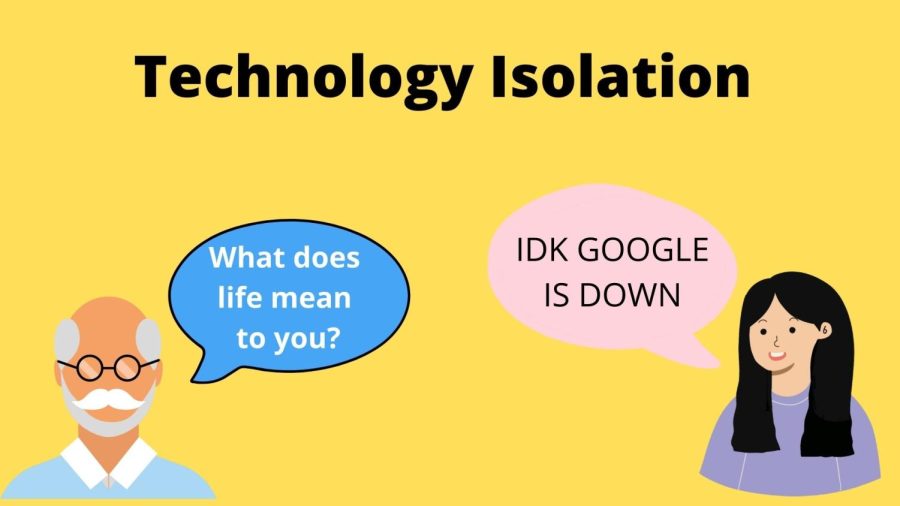The hard truth: technology makes the world lonelier
As society makes rapid advancements with technology, people become concerned with the amount of time others spend on their phones. With the number of differences between people in society, citizens feel forming relationships with people who share similar interests without technology defies reality. With people stuck in the digital universe, technology divides the world.
May 11, 2022
83.72% of people in the world own a smartphone and 91.54% of people own a non-smartphone. Over time, the development of technology allows people to communicate with others millions of miles away. Members of the society can stay in touch with their friends and family through apps such as Facebook, Messenger and Instagram. With the prominence of technology in everyday life, the question of whether society becomes too involved in their phones and computers arises.
The communications made on social media frequently become ephemeral. On apps such as Snapchat, with 557.1 million users, most people just send pictures back and forth. People cannot hold valuable conversations when snapping selfies with one another. Social media causes a break in society because people would rather snap at others living millions of miles away, rather than hold a conversation with the person right in front of them.
People generally hype up their lifestyle on social media. They alter their appearance, using apps such as Facetune to tweak their imperfections, possibly making their waist smaller or teeth brighter. Through this facade, people hide their true selves. If someone met a person they talk to on the internet, they might not even recognize them. This makes people wonder if they really know the person they met online.
“I think technology makes society more alone than it [brings] others together. With so much technology, people tend to ignore the others around them and alienate themselves. Although video-chatting for long-distance contact and emails exist and stuff, I feel like people are really buried in their phones. Social media doesn’t make things much better, either, but it can be fun seeing what others are up to, which is one of the few ways technology unites people,” sophomore Samuel White said.
During the COVID-19 pandemic, the world has learned to lean on technology to complete its tasks. During quarantine, parents worked from home and students attended school virtually. Even though people slowly transitioned back into their normal lifestyles, the world still pays the price for the sudden increase in the use of technology. Countless people would rather stay at home on their phones than travel out and enjoy social interactions. Staying preoccupied on the phone can cause depression because of the lack of social company.
“The main takeaway is that smartphone dependency directly predicts later depressive symptoms. There’s an issue where people are entirely too reliant on the device, in terms of feeling anxious if they don’t have it accessible, and they’re using it to the detriment of their day-to-day life,” professor of Behavioral Sciences at the University of Arizona Matthew Lapierre said.
Critics may argue that technology actually brings people together. They believe that human beings that share similar interests can interact with each other online and make friends, but these people will most likely never meet. Humans face the risk of putting too much time and energy into finding online friends, and they forget to look at the people in the same vicinity.
“Our culture has put upon us these expectations that if we’re going to be successful we need to have a huge network of contacts. That extra set of expectations makes the experience of aloneness even harder. Our grandparents, our great-grandparents, didn’t think they were going to have an average of 338 Facebook friends,” history professor at Weber State University, Susan Matt said.
Society cannot stop using technology, however, individuals can limit its usage. Simply asking how a family member’s day went can ignite the flame to rekindle tangible relationships with each other. Internet friendships can turn into long-lasting relationships, but people must remember to start with the people in front of them.







